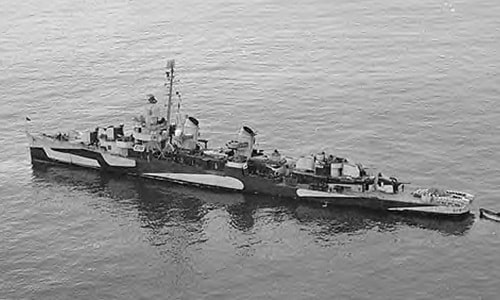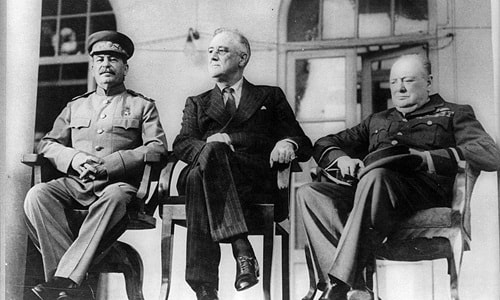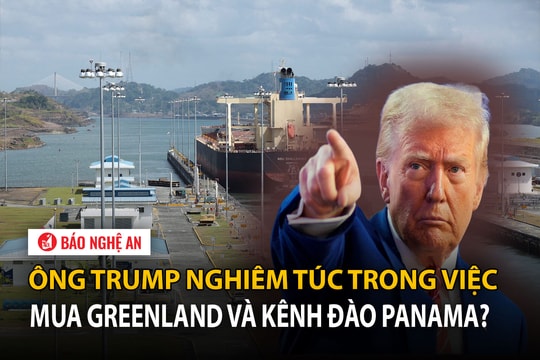US warship nearly sank President Roosevelt's ship
In addition to the torpedo incident that nearly sank the president's ship, the infamous warship Porter also collided with a neighboring ship and fired artillery into the base commander's yard.
 |
US Navy warship William D. Porter. Photo: Wikipedia |
The USS William D. Porter is the most special warship of the US Navy. During its more than 10 years of operation, this warship has caused many serious incidents, significantly affecting the reputation of the world's most powerful and combative naval force, according to History.
In late 1943, US President Franklin Roosevelt and top military generals planned to cross the Atlantic on the battleship Iowa to attend a summit meeting with British Prime Minister Winston Churchill and Soviet General Secretary Joseph Stalin to discuss the situation of World War II.
USSWilliam D. Porter was then aThe Iowa was launched four months ago, with 125 sailors, mostly rookies, assigned to the top secret mission of joining the escort, ensuring absolute safety for the ship Iowa carrying the President.
As soon as they left the port, the sailors on the Porter forgot to weigh anchor. This fatal forgetfulness caused the Porter to depart later than planned. Not stopping there, the Porter's anchor also hit the warship moored next to it, causing the railing, lifeboat, a small boat and equipment of the ship to be thrown into the sea. The Porter's captain then could only apologize a few words and hurriedly get the ship out of port to make it on time.
Twenty-four hours later, the Porter made another blunder during an anti-submarine exercise. While conducting a simulated mine launch, the crew forgot to disable the real mines for safety.
A mine fell onto the deck and rolled into the sea, far enough to sink the Iowa, along with the president. Fortunately, the mine sank before detonating, causing only a shock wave that threw one sailor from the Porter into the sea. However, the explosion set off alarms on other ships in the convoy, causing the entire fleet to panic, believing they were under attack by Nazi Germany.
The above incident made the captainWilfred WalterThe Porter ship was embarrassed before the naval commander and the President.Roosevelt. Hedecided to save the ship's honor by demonstrating its mock torpedo firing skills while the convoy conducted an air defense exercise in Bermuda waters.
In the mock drills, the torpedo would be stripped of propellant, preventing it from exiting the tube when the order to fire was given. In addition, torpedo firing drills required targets, and the sailors on the Porter aimed at the largest, nearest target: Iowa, the battleship carrying the President.
However, the torpedo crew forgot to remove the propellant from the torpedo in compartment 3. The torpedo launch drills in compartments 1 and 2 proceeded normally under Captain Walter's orders, but in compartment 3, disaster began to strike.
 |
Soviet General Secretary Joseph Stalin, US President Franklin Roosevelt and British Prime Minister Winston Churchill (from left to right) during a meeting in 1943. Photo: History |
After the launch order, the sailors on the deck of the Porter were shocked to realize that the torpedo had shot out of the tube and headed straight for the Iowa. The entire ship immediately fell into a state of panic, racing against time, because the torpedo only needed two minutes to reach its target.
The sailors panicked and tried to radio to inform the Iowa to avoid it, but the escort fleet had a rule against radio communication to ensure secrecy, so they were forced to use a coded signal to notify the Iowa.
Once again, the unprofessionalism of the Porter's crew was shown when, instead of signaling "Torpedoes are heading towards Iowa," the radio operator mistakenly sent "Torpedoes launched from Iowa." Realizing the mistake, the sailor quickly sent another warning signal, but again mistakenly sent the message "Porter is retreating at full speed."
After recovering, Captain Walter decided to ignore the security regulations and used the radio to call the Iowa to turn right because a torpedo was coming. While the Iowa's radio operator was bewildered, the lookout sailor on the ship also discovered the torpedo and shouted to turn right immediately.
The Iowa listed heavily as she made the sharp turn, and the crew began firing at the torpedo, trying to neutralize it. Fortunately, the torpedo missed the ship's side by inches and exploded, sending a column of water soaring alongside the ship.
Suspect shipUSS William D. Porter rebelled, and the battleship Iowa turned all its guns on the ship, demanding an explanation. Although Captain Walter claimed it was an accident,The Porter was ordered to leave its escort fleet and dock at a US naval base in Bermuda for investigation.
When the ship docked, armed Marines were waiting and arrested the entire crew, the first mass arrest in US naval history. An investigation determined the incident was an accident during a training exercise.
After 1943, Porter was only allowed to participate in missions that did not pose a threat to the safety of other American warships. Other ships, when encountering Porter, would often wave and say, "Don't shoot, we are Republicans," in a sarcastic manner to the crew.
Although the next generation of crews worked hard to improve their image, they still seemed to be haunted by the bad luck of the past. During a deployment in the Aleutian Islands, a drunken sailor fired a shell that hit the front yard of the base commander’s house while the officer was having a small party for his fellow officers and their wives. Fortunately, no one was killed in the incident.
USS William D.Porter was later sunk by Japanese aircraft in May 1945 off Okinawa, the crew of the infamous ship was fortunately rescued.
According to VNE
| RELATED NEWS |
|---|






